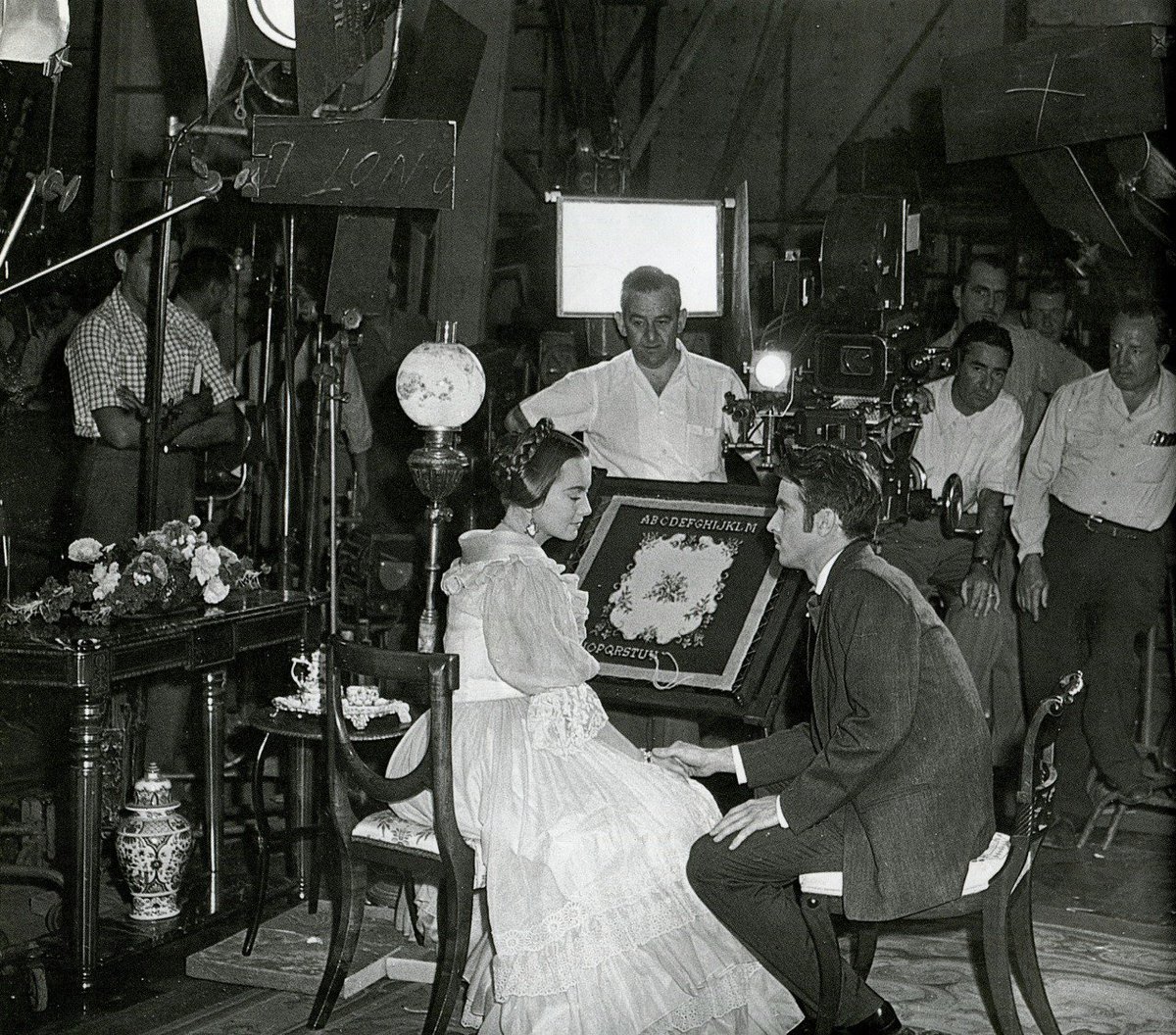Which directors directed the most movies on this blog?
Now that I’ve posted my favorite movie(s) of each year from 1920 to 2020, let’s look at which directors directed the most of those movies.
And the winner is …
Alfred Hitchcock, who made sharply stylized suspense movies with a mischievous sense of humor. He directed 11 movies on my list: Rebecca (1940), 🎬 Suspicion (1941), Shadow of a Doubt (1943), Notorious (1946), Rope (1948), Strangers on a Train (1951), Dial M for Murder (1954), Rear Window (1954), 🎬 The Wrong Man (1956), Vertigo (1958), Psycho (1960) 🎬
(Click the year to go to my post about each movie. The clapboard 🎬 emoji after the title means the movie was nominated for the Oscar for Best Director; movies that won the award get a trophy 🏆 emoji.)
I do not have the secret of Alfred Hitchcock and neither, I am convinced, does anyone else. He made movies that do not date, that fascinate and amuse, that everybody enjoys and that shout out in every frame that they are by Hitchcock. … His purpose was simply to pluck the strings of human emotion — to play the audience, he said, like a piano. Hitchcock was always hidden behind the genre of the suspense film, but as you see his movies again and again, the greatness stays after the suspense becomes familiar. — Roger Ebert
 |
| Hitchcock’s cameo in Strangers on a Train, passing by Farley Granger. |
In second place, with 9 movies on my list:
Woody Allen, who respects the audience enough that he often won’t give us a pat, comforting ending, made Bananas (1971), Sleeper (1973), Annie Hall (1977), 🏆 Manhattan (1979), Broadway Danny Rose (1984), 🎬 Hannah and Her Sisters (1986), 🎬 Crimes and Misdemeanors (1989), 🎬 Husbands and Wives (1992), Match Point (2005)
:max_bytes(150000):strip_icc():format(webp)/mcdmapo_ec031_h-2000-35ac387f5e604b1aa1aa51b34591761c.jpg) |
| Woody Allen and Scarlett Johansson making Match Point. |
In third place, with 8 movies on my list:
Billy Wilder, who was stunningly fluid and graceful in moving from drama to comedy and back again, made Double Indemnity (1944), 🎬 The Lost Weekend (1945), 🏆 Sunset Boulevard (1950), 🎬 Ace in the Hole (1951), Stalag 17 (1953), 🎬 Witness for the Prosecution (1957), 🎬 Some Like It Hot (1959), 🎬 The Apartment (1960) 🏆
 |
| Jack Lemmon, Shirley MacLaine, and Billy Wilder worked together on The Apartment. |
 |
| Wilder’s gravestone in Los Angeles. |
These directors made 7 movies each on my list:
Ingmar Bergman: Summer with Monika (1953), Sawdust and Tinsel (1953), Smiles of a Summer Night (1955), Wild Strawberries (1957), Through a Glass Darkly (1961), Persona (1966), Shame (1968)
If your tooth hurts, your tongue keeps going there. You are always conscious of a wound. — Ingmar Bergman
 |
| Liv Ullman and Bergman in Liv & Ingmar, a 2012 documentary. |
Louis Malle made some movies in French and some in English: Elevator to the Gallows (1958), Zazie dans le Métro (1960), The Fire Within (1963), Lacombe, Lucien (1974), Atlantic City (1980), 🎬 My Dinner with Andre (1981), Au Revoir les Enfants (1987)
Film is a very manipulative medium. It is so easy to manipulate audiences with music, with a close-up, or with editing. It’s a Pavlovian medium in the sense that you can almost mathematically get any reaction you want. I try to avoid that kind of cheap manipulation and try to impress the audience on a higher level, not to force them but trust them to make their own choices. — Louis Malle
 |
| Louis Malle and Susan Sarandon on the set of Atlantic City. |
These directors made 6 movies each on my list:
Charlie Chaplin: The Kid (1921), The Gold Rush (1925), City Lights (1931), Modern Times (1936), The Great Dictator (1940), Limelight (1952)
Tragedy stimulates the spirit of ridicule. Ridicule is an attitude of defiance. We must laugh in the face of our helplessness against the forces of nature, or go insane. — Charlie Chaplin
Stanley Kubrick: The Killing (1956), Paths of Glory (1957), Lolita (1962), Dr. Strangelove (1964), A Clockwork Orange (1971), 🎬 The Shining (1980)
There is no deliberate pattern to the stories that I have chosen to make into films. About the only factor at work each time is that I try not to repeat myself. — Stanley Kubrick
 |
| Kubrick and Kirk Douglas on the set of Paths of Glory. |
One director made 5 movies on my list:
Fritz Lang: Metropolis (1927), M (1931), Scarlet Street (1945), The Big Heat (1953), Human Desire (1954)
These directors made 4 movies each on my list:
Richard Linklater, an experimental director who savors conversations more than storylines, had his breakthrough with Slacker (1990), and later made the romantic trilogy of Before Sunrise (1995), Before Sunset (2004), and Before Midnight (2013)
As you get older, you want less from the world. You just want to experience it. Any barriers to feeling emotions get dismantled, and ordinary things become beautifully poetic. — Richard Linklater
 |
| Linklater shares his philosophical musings with a cab driver in the first scene of Slacker. |
William Wyler had no easily recognizable style or persona, but he doggedly put out one brilliant dramatic work after another: Dodsworth (1936), 🎬 Wuthering Heights (1939), 🏆 The Best Years of Our Lives (1946), 🏆 The Heiress (1949) 🎬
 |
| William Wyler directs Olivia de Havilland and Montgomery Clift in The Heiress. |
Here are over a dozen directors with 3 movies on this blog:
Frank Capra: It Happened One Night (1934), 🏆 Mr. Smith Goes to Washington (1939), 🎬 It’s a Wonderful Life (1946) 🎬
Francis Ford Coppola: The Godfather (1972), 🎬 The Godfather Part II (1974), 🏆 The Conversation (1974)
 |
| Marlon Brando and Francis Ford Coppola making The Godfather. |
George Cukor: Gone with the Wind (1939) [uncredited directing], The Women (1939), Gaslight (1944)
Jules Dassin directed the prison noir Brute Force (1947) and the apple-focused noir Thieves’ Highway (1949), before moving to Europe and directing the French heist noir Rififi (1955)
Howard Hawks liked to pit men and women against each other: Bringing Up Baby (1938), Only Angels Have Wings (1939), Gentlemen Prefer Blondes (1953)
Buster Keaton: Day Dreams (1922), Our Hospitality (1923), The General (1926)
Akira Kurosawa: Rashomon (1950), Ikiru (1952), High and Low (1963)
Mike Leigh focuses on everyday British life: Life Is Sweet (1990), Secrets & Lies (1996), 🎬 Happy-Go-Lucky (2008)
Ernst Lubitsch had such a recognizable comedic style it was known as “the Lubitsch touch,” which you can see in Trouble in Paradise (1932), Design for Living (1933), and The Shop Around the Corner (1940)
Norman Z. McLeod made classic comedies: Monkey Business (1931), Horse Feathers (1932), It’s a Gift (1934)
Martin Scorsese: Taxi Driver (1976), After Hours (1985), GoodFellas (1990) 🎬
 |
| Scorsese’s cameo in After Hours, shining a spotlight from the upper level of a punk club. |
James Whale made Frankenstein (1931), its sequel Bride of Frankenstein (1935), and another classic horror movie, The Invisible Man (1933)
 |
| Boris Karloff and James Whale on the set of Frankenstein. |
Michael Winterbottom directed a series of movies where two actors play themselves going on trips together: The Trip (2010), The Trip to Spain (2017), The Trip to Greece (2020)
Robert Zemeckis directed the Back to the Future trilogy (1985, 1989, 1990)
.webp) |
| Christopher Lloyd, Robert Zemeckis, and Michael J. Fox on the set of Back to the Future Part II. |
And over 2 dozen directors directed 2 movies each on my list:
Paul Thomas Anderson: Hard Eight (1996), Boogie Nights (1997)
Bong Joon-ho: Mother (2009), Parasite (2019) 🏆
James Cameron: The Terminator (1984), Terminator 2 (1991)
Michael Curtiz: The Sea Wolf (1941), Casablanca (1942) 🏆
Jonathan Demme made movies animated by a wild, musical spirit: Stop Making Sense (1984), Something Wild (1986)
David Fincher: The Social Network (2010), 🎬 Gone Girl (2014)
Victor Fleming: The Wizard of Oz (1939), Gone with the Wind (1939)
John Ford: The Whole Town’s Talking (1935), The Man Who Shot Liberty Valance (1962)
Miloš Forman was fascinated by the wild man who shakes up the system: One Flew over the Cuckoo’s Nest (1975), 🏆 The People vs. Larry Flynt (1996) 🎬
John Huston: The Treasure of the Sierra Madre (1948), 🏆 The Asphalt Jungle (1950) 🎬
John [Huston] has meant a great deal in my life. Nobody would have heard of me if it hadn’t been for him. … He’s an artist with a camera — he sees it like a painter. — Marilyn Monroe
Philip Kaufman: Invasion of the Body Snatchers (1978), The Unbearable Lightness of Being (1988)
Lee Chang-dong: Secret Sunshine (2007), Burning (2018)
Mervyn LeRoy: I Am a Fugitive from a Chain Gang (1932), The Wizard of Oz (1939) [uncredited directing]
Joseph H. Lewis directed iconic noirs: Gun Crazy (1949), The Big Combo (1955)
Joseph L. Mankiewicz made clever dramedies where smart characters wonder who they can trust: A Letter to Three Wives (1949), 🏆 All About Eve (1950) 🏆
Leo McCarey: Duck Soup (1933), The Awful Truth (1937)
Jean-Pierre Melville: Le Doulos (1962), Le Samouraï (1967)
Cristian Mungiu shows ordinary people trapped in corrupt systems: 4 Months, 3 Weeks and 2 Days (2007), Graduation (2016)
Fred C. Newmeyer directed Harold Lloyd in silent comedies: Safety Last! (1923), Girl Shy (1924)
Alexander Payne directs low-key, dramatic comedies: About Schmidt (2002), Nebraska (2013)
Comedy is a wonderful device … that allows us to look at what we’re talking about with some degree of distance and hopefully with a bit more honesty. — Alexander Payne
 |
| Alexander Payne and Jack Nicholson on the set of About Schmidt. |
D.A. Pennebaker made documentaries about lots of people coming together over a shared passion: a music festival in Monterey Pop (1968), and a political campaign in The War Room (1993)
Otto Preminger: Laura (1944), Anatomy of a Murder (1959)
Todd Solondz: Welcome to the Dollhouse (1995), Happiness (1998)
Preston Sturges, who wrote the movies he directed back when that was uncommon, was the comedic mind behind Sullivan’s Travels (1941) and Unfaithfully Yours (1948)
Jacques Tourneur made the chillingly strange Cat People (1942), and then the classic noir Out of the Past (1947)
Jan Troell directed a two-part epic period piece about farmers struggling for a better life: The Emigrants (1971) and The New Land (1972)
Frederick Wiseman makes documentaries that take us inside American institutions: High School (1968), Law and Order (1969)
I think it’s as important to document kindness, civility, and generosity of spirit as it is to document cruelty, banality, and indifference.— Frederick Wiseman (in his 2016 Oscar acceptance speech)
Sam Wood: A Night at the Opera (1935), Gone with the Wind (1939) [uncredited directing]
Terry Zwigoff: Crumb (1994), Ghost World (2001)
 |
| Terry Zwigoff directing Thora Birch and Steve Buscemi in Ghost World. |
Honorable mention goes to these acclaimed directors who each made one movie on my list:
Robert Altman: The Player (1992) 🎬
Peter Bogdanovich: The Last Picture Show (1971) 🎬
Federico Fellini: La Strada (1954)
Sidney Lumet: Dog Day Afternoon (1975) 🎬
Terrence Malick: Days of Heaven (1978)
Quentin Tarantino: Pulp Fiction (1994) 🎬
Orson Welles: Citizen Kane (1941) 🎬
Wim Wenders: Paris, Texas (1984)
 |
| Fellini photographing Giulietta Masina on the set of La Strada. © 1954 Ponti-De Laurentiis Cinematografia. |

Comments
Post a Comment
Thanks for submitting a comment on my movie blog! 🎬 Your comment won’t show up here right away. 😐 To make sure your comment gets seen, I recommend sharing this post on social media and saying whatever you feel like! 🤓